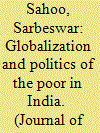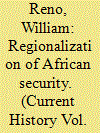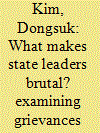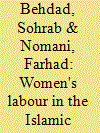| Srl | Item |
| 1 |
ID:
129451


|
|
|
|
|
| Publication |
2014.
|
| Summary/Abstract |
The paper addresses two basic questions in the globalization literature: (1) is globalization a threat or an opportunity? And (2) how far does market deepening actually encourage genuine substantive democracy in the world? Many scholars have argued that globalization has resulted in increasing inequality and marginalization of the poor, which is not conducive for democracy. Drawing on the case of India, this paper, however, argues that the rolling back of the welfare state and the demise of developmentalism led to the mobilization of the masses against the elitist and exploitative agenda of globalization. As a result, a counter-hegemonic vibrant civil society has emerged, which challenges the hegemony of the elites and channels the empowerment agenda of the subaltern groups. This new politics of the subaltern is grounded on the idea of social justice and citizenship rights, which is redefining the nature of the Indian state and democracy.
|
|
|
|
|
|
|
|
|
|
|
|
|
|
|
|
| 2 |
ID:
115620


|
|
|
|
|
| Publication |
2012.
|
| Summary/Abstract |
From the perspective of officials in Africa, participating in regional conflict management is now one of the best ways for governments . . . to get international resources to strengthen their own authority.
|
|
|
|
|
|
|
|
|
|
|
|
|
|
|
|
| 3 |
ID:
099851


|
|
|
|
|
| Publication |
2010.
|
| Summary/Abstract |
What makes state leaders enmeshed in civil war commit mass killings against their own populations? This article explores this question by synthesizing grievances and mass killing. It investigates how factors or contexts that breed or exacerbate grievances can trigger state-sponsored mass killing during civil war. Severe political and economic marginalization and a history of intense armed conflict can engender staunch civilian support for insurgents, which prompts embattled rulers to orchestrate mass killing as a strategy of neutralizing insurgent combatants and warding off future rebellion. To verify this argument, a dataset is constructed that contains information on civil wars from 1945 to 2007 and large-N statistical analyses are conducted. The results corroborate the author's theoretical arguments with respect to political marginalization and history of armed conflict, but not with respect to economic marginalization. The argument and findings suggest that (1) grievances account for mass killing perpetrated by the government during civil war and (2) different sources of grievances have varying effects on mass killing.
|
|
|
|
|
|
|
|
|
|
|
|
|
|
|
|
| 4 |
ID:
114868


|
|
|
|
|
| Publication |
2012.
|
| Summary/Abstract |
This article examines the changes in the female class structure of the urban work force in post-revolutionary Iran by investigating the rate and pattern of the exclusion and the incorporation of women in the market between 1976 and 2006. We examine the gender marginalization thesis and test it empirically by focusing on the class nature of women's exclusion and incorporation into the labour force. We rely on decennial census data and present our empirical finding in the context of the social hierarchy of work. Moreover, we provide a comparative empirical analysis of the economic marginalization process for urban women's and men's class locations historically.
|
|
|
|
|
|
|
|
|
|
|
|
|
|
|
|